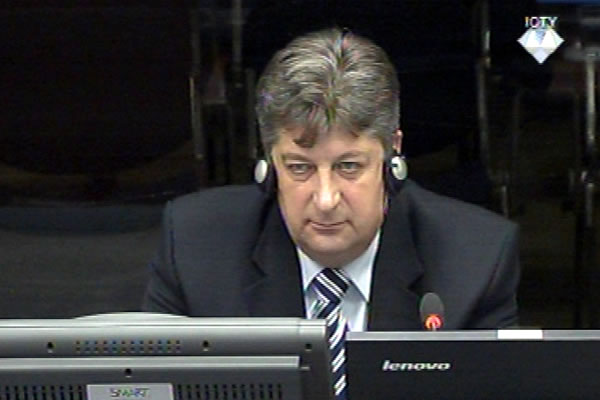Home
KARADZIC DECIDES NOT TO TESTIFY IN HIS OWN DEFENSE
Radovan Karadzic decided not to give evidence in the proceedings against him at the Tribunal. Momcilo Gruban, former guard shift commander in the Omarska prison camp near Prijedor, completed his evidence. According to Gruban, he should never have been sentenced to seven years in prison, but commended for assisting the prisoners in Omarska
 Momcilo Gruban, witness at the Radovan Karadzic trial
Momcilo Gruban, witness at the Radovan Karadzic trial Radovan Karadzic announced that he would not testify in his own defense in the proceedings against him at the Tribunal. Karadzic reached the decision suddenly, following a discussion in court about the communications between the accused and his legal advisor during the testimony. Karadzic had been slated to begin his evidence for 3 March 2014. ‘I have decided not to testify’, Karadzic said. Judge Kwon concluded that it was ‘the end of the story’. Judge Kwon indicated that the last witness on Karadzic’s list would testify on 3 March 2014.
Before the debate about Karadzic’s testimony, the court heard the evidence of Karadzic’s defense witness, Momcilo Gruban Ckalja. He used to be a guard shift commander in the Omarska prison camp near Prijedor, and was sentenced by the BH Court in 2009 to seven years for the Omarska crimes. In 2010, Gruban was paroled. Prijedor is one of the seven municipalities in Bosnia and Herzegovina where, as the prosecution alleges, the crimes against non-Serbs reached the scale of genocide. In the statement to Karadzic’s defense Gruban said there were no beatings, killings, and improper interrogations of the detainees in Omarska. The bad conditions in the prison camp were the result of the war and reflected the general shortages of food and medicines.
In the cross-examination by prosecutor Ann Sutherland, Gruban said he should never have been sentenced to prison by the BH Court, but ‘commended’ for assisting the prisoners. As he said, he and the police officers under his command helped the prisoners ‘as much as we could within our power’. Gruban ‘heard’ about the incidents in which armed groups that were not part of the government system entered the ‘collection and investigation center’ in Omarska to ‘settle scores’ with specific detainees. Those ‘paramilitaries’ were too well armed for the police guarding the prison camp to resist them.
The prosecutor confronted the witness with the evidence called before the Tribunal and the BH Court, showing that many prisoners were beaten to death, shot or taken away. Their remains were recovered from mass graves later. Gruban stubbornly maintained that he never saw any prisoners being beaten or killed. This couldn’t have happened on his watch, Gruban explained. Had there been any such incidents in his absence from the camp, he ‘would have heard about them’.When the prosecutor put it to him that some detainees died because of lack of adequate medical care, Gruban retorted that the same could be said of the Tribunal’s Detention unit. ‘People have died there too’, Gruban said. The witness’s answer to the question about inadequate nutrition for the prisoners was similar: ‘Maybe there wasn’t enough food, but there is no good food for detainees’. There were complaints about the food quality in the Tribunal’s Detention Unit, Gruban added, although the Tribunal ‘is able’ to ensure good diet for the detainees; that was not the case in Omarska.
Linked Reports
- Case : Karadzic
- 2014-02-19 KARADZIC’S SWEET WITNESS
- 2014-02-18 KARADZIC’S THEORY ABOUT BODIES IN TOMASICA
- 2014-02-18 KARADZIC WANTS MILDER SENTENCE BECAUSE OF HIS ‘AGREEMENT’ WITH HOLBROOKE
- 2014-02-27 KARADZIC WANTS ONE YEAR TO PREPARE HIS FINAL BRIEF
- 2014-02-27 ‘GENTLEMEN’S AGREEMENT’ MAY HELP KARADZIC
- 2014-03-03 PROSECUTION WANTS TO FILE LONGER FINAL BRIEF BY 17 SEPTEMBER 2014
